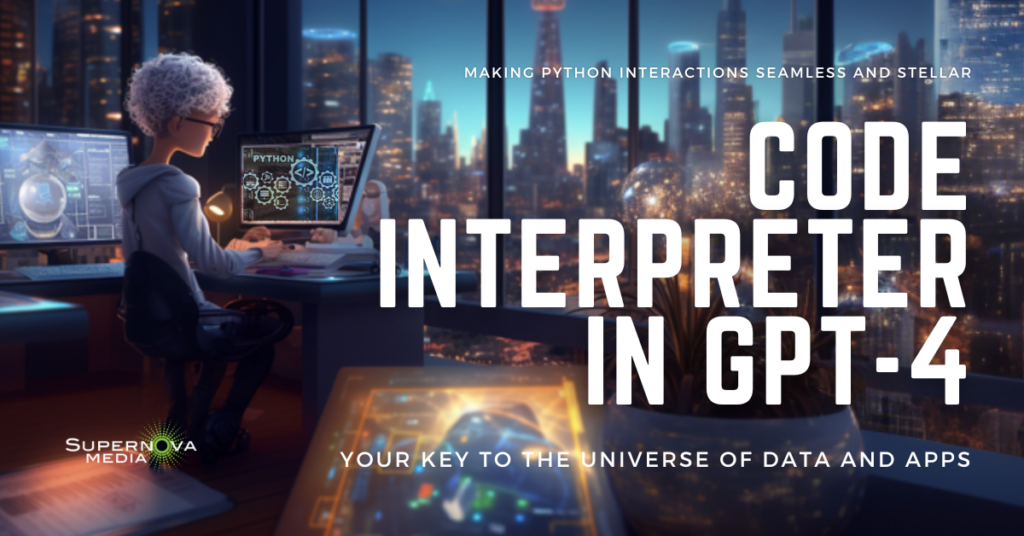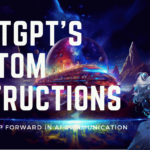|
Getting your Trinity Audio player ready...
|

Hello, space explorers! It’s Captain Nancy here, welcoming you back to another edition of “Jupiter Journals”.
Today, we unveil a new celestial body in the constellation of OpenAI’s GPT-4 galaxy – Code Interpreter. This innovation opens up exciting opportunities for Python coders and non-coders alike to explore uncharted territories.
All Aboard the Code Interpreter Spacecraft!
Imagine stepping aboard an interstellar spacecraft equipped with a state-of-the-art computer, granting you both computational power and storage space right at your fingertips! That’s what you get with Code Interpreter, a live sandbox where Python code comes alive, ready to obey your command.
Alien File Formats: No Longer Alien!
Code Interpreter is your versatile astronaut, trained to navigate the universe of data file formats. Here’s how it manages the various data files you might encounter on your journey:
- Text Files: Like simple alien messages, Python can read and write these basic .txt files.
- CSV and TSV Files: The ‘Universal Translators’ of data, helping Python communicate in comma-separated values (CSV) and tab-separated values (TSV).
- JSON Files: Encrypted messages of the web universe, Python is adept at decoding JSON files into understandable lists and dictionaries, and vice versa.
- Excel Files: Like cosmic spreadsheets, Python can easily navigate .xlsx and .xls files.
- PDF Files: The official archives of the data universe, Python can read, modify, and even author PDF files.
- HTML and XML Files: These are the blueprints and roadmaps of the web cosmos. Python can parse these files for useful information.
- Image Files: With Python as your cosmic camera, reading, writing, and editing image files is a breeze.
- Audio Files: Python can tune into the soundtracks of the data universe, handling audio files like .mp3, .wav, etc.
- Video Files: Consider these as your galactic cinema. Python can extract frames or metadata from video files like .mp4, .avi, etc.
- Binary Files: Like encrypted space transmissions, Python can read and write these binary files.
- Database Files: The mega libraries of the data universe, Python can interact with various databases with ease.
- ZIP Files: Just like packing for a space journey, Python can read and write .zip files, making data travel convenient.
- Word, PowerPoint Files: The presentation decks of the cosmos, Python can craft and read .docx and .pptx files with ease.
- HDF5 Files: The black boxes of vast datasets, Python can read and write Hierarchical Data Format version 5 (HDF5) files.
Python: A Jack of All Trades
As you can see, Python truly is the Jack of all trades in our data universe, being adept at interacting with a myriad of file formats. However, its capabilities don’t stop at just files. It extends its proficiency to a wider array of applications, making our lives simpler and tasks quicker. Let’s look at how Python doubles up as your personal assistant, connecting you to the everyday apps you love and use.
- Google Drive: Think of Python as your personal space courier, capable of sending, fetching, or altering files in your Google Drive.
- Dropbox: It’s like having an interstellar dropbox! Python can manage your files, aiding you in uploading, downloading, and sharing documents.
- Microsoft Excel or Word Online: Python, like a skilled diplomat, can interact with documents or spreadsheets in Microsoft’s online suite through the Microsoft Graph API.
- Gmail: Imagine Python as your personal space postman, able to send emails through Gmail, and even read and process incoming messages.
- Twitter: Just like sending cosmic signals, Python can tweet, retweet, or even like posts on your behalf on Twitter.
- Facebook: Imagine Python as your social media manager in the cosmos, posting statuses, uploading photos, or reading posts from your Facebook feed.
- Slack: Python can be your intergalactic communicator, capable of sending messages, uploading files, or creating channels on Slack.
- Trello: Think of Python as your space project manager, creating cards, lists, or boards on Trello to help you manage your tasks better.
- Evernote: Like a cosmic scribe, Python can create, read, and edit notes in your Evernote account.
- IFTTT (If This Then That): Imagine Python as the orchestrator of your space automation, triggering or responding to IFTTT events, allowing you to automate tasks across different apps and devices.
This opens up a whole new cosmos of possibilities, doesn’t it? Just bear in mind, Python’s ability to connect with these platforms can depend on where you’re coding.
Isn’t this an exhilarating era of interstellar exploration? With the Code Interpreter, your coding journey in ChatGPT is just like a cosmic adventure, offering you the power to compute, explore, and even connect with everyday apps via natural language.
Happy exploring, fellow space voyagers!


















